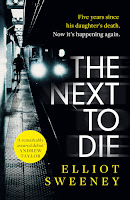Turn on the TV and we’re flooded with pictures of fuel poverty, the social care and NHS collapsing, strikes in public services; there’s the growth of foodbanks, a police force full of misogynists and sadists, kids knifing kids. Is the world becoming an increasingly barbed, hostile place?
I’m jaded of course. As well as being a crime fiction aficionado, I’m a mental health nurse, a vocation that means I regularly meet some of the most disadvantaged, vulnerable and stigmatize in society. Their human sufferings often seem needless, borne from inequity, and have left me hardened me in ways I haven’t reconciled, perhaps never will.
As a writer, I’ve found the day job has proven to be fertile soil for stories. I don’t need to go hunting for characters: when you’re up close to the sharp edge of human emotions – anger, jealousy, hatred – they present themselves and become hard to ignore.
The bereft mother of a schizophrenic teen lost to suicide seeks revenge on the systemic failures that led to her boy’s death. An orphan who witnesses his father’s murder at the hands of racist police grows into a sadist himself, fuelled by a propulsive need for revenge. Both characters, anonymised here for patient confidentiality, are based on real encounters. They and a list of others are calling out to be written about.
So long as the characters are razor sharp, I’m of the belief that a decent crime novel is possible, even if the plot is mediocre. And to make characters bear verisimilitude, the writing needs to seem socially accurate. James Lee Burke, George Pelecanos, and Elmore Leonard all pen slick, streetwise prose delivered by multicultural, often poorly educated locals whose prose integrates patois and swinging vernacular with masterful ease. To read them feels immersive and entirely natural; yet in less skilled hands, I’m sure such attempts would plunge into cliché. Indeed, while describing his research style, Pelecanos has commented on his habit of situating himself in bars and clubs, ordering a beer, and listening to the comings-and-goings of those around him, a method I have imitated (can my bar-tab be put through as a legitimate expense, I wonder?).
On a macro level, social themes have the capacity to provide a crime novel with an added dimension that resonates long after the final plot twist. A recent example was S.A.Crosby’s Razorblade Tears: two fathers investigating the murders of their sons is a fairly interesting, but not wholly original premise; but when those sons were in a gay relationship, and the fathers, one white, one black, both carry unresolved issues around race, homosexuality, masculinity and class, we have a tale for its time. In a similar vein, Will Dean’s The Last Thing to Burn, about a woman held captive by a psychopathic farmer, could have felt like a derivative locked room story akin to Misery or Room; but make her an illegal migrant smuggled into the UK and purchased into modern slavery, and there’s a cutting story with propulsive social importance.
When I set out to write The Next to Die, the first in the Dylan Kasper series, my aim was to fuse the hardboiled crime genre I fell for as a teen with difficult topics I’d encountered in my career in psychiatry – specifically, men’s mental health, the mess left by suicide, and the harsh realities of post-traumatic stress and abuse. I was compelled to tackle these topics gloves off, and inject the story with both the grim irresolution, but also the dark humour that can come when immersed in a world like this.
Although the novel has been labelled bleak, and according to some, in need of trigger warnings (is this a bad thing in crime fiction, I wonder?), the writing process was strangely lilting. It has allowed me to form a semblance of order out of the chaos and re-evaluate some tough memories that had hitherto been unresolved.
And if readers found Book One heavy going, wait till they get a load of Book Two...
The Next To Die by Elliot Sweeney (Wildfire) (Headline Publishers)) Out Now.
Five years since his daughter's death. Now it's happening again. Dylan Kasper is stuck. Living in self-imposed reclusion from his former life in the police, he's been in a downward spiral since his daughter's death five years ago. All that changes when the son of an esteemed professor jumps under an inner-city train. His former colleagues call it suicide, but Kasper knows different. This has all happened before - to him, and his dead daughter. Taking on the investigation himself, Kasper soon realises the terrible trouble young Tommy had found himself in. With nowhere to run, he thought suicide was the only way to keep his family safe. But before long, Kasper's investigation makes him target number one. Can he keep his demons in check and stay alive long enough to bring those responsible to justice?
More information about Elliot Sweeney and his work can be found on his website. You can also follow him on Twitter @elliotfsweeney.



No comments:
Post a Comment